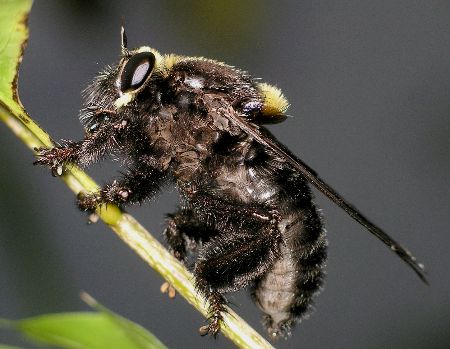by Valerie
August, 2005Big Black Robber Fly
Our featured animal this month has been making appearances in our yard for at least three weeks now. The big black robber fly (Mallophora leschenaulti) is actually a year 'round resident but I only see the adults in the late summer. During the rest of the year, the larvae and pupae live in the soil of our lawn. I am very grateful to Giff Beaton for identifying this species for me. Robber flies are impressive predators that take on flying insects as their principal prey. Depending on the size of the species, they may eat small flies or large bugs, dragonflies, and bees. The big black robber fly has no common name, but it is certainly the biggest fly I have seen here, and it is mostly black. It is also very fuzzy and resembles a huge bumblebee. In spite of their imposing size and appearance, the robber flies pose no threat to humans, although I suspect they can give a nasty bite if handled carelessly. Most of the individuals observed in our yard have just emerged from their pupa shells. Like many other kinds of insects that have an adult flying form, they must wait for their wings to dry and harden before they can fly away. The heavy body of these flies makes their initial take-off from the ground a bit of a problem. I've seen them try to climb up on a blade of grass, only to have it bend under their weight. If they try to fly from the ground, they cannot usually get airborne. Sometimes I help them by lifting them up into the air, at which point they quickly fly off. The flies also hunt around our yard and can usually be seen perched on a stick, either waiting for prey or consuming their latest catch. The females are slightly larger than the males, as is the case with many fly species. Last year, I was fortunate to watch a female lay her eggs on a small branch, about 6 feet off the ground. She created an egg mass that looked similar to those of preying mantises, but it was white and more irregular in shape. The newly hatched maggots would have had to get down to the ground, most likely by falling. |
